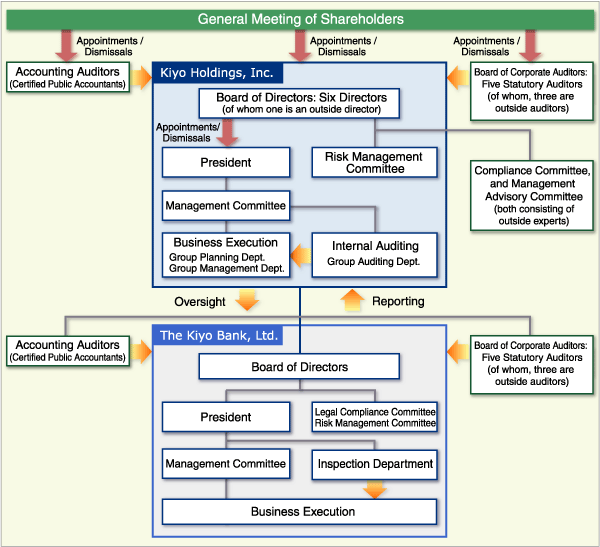|
Corporate Governance
1. Basic Approach to Corporate Governance
Kiyo Holdings, Inc. (the “Company”) and every other member of the Kiyo Financial Group recognizes the paramount importance of fostering a culture that values management transparency and compliance as a means of strengthening corporate governance to enhance enterprise value.
2. Corporate Governance Initiatives
(1) Expanding the Monitoring Function of the Board of Directors and Accelerating the Decision-Making Process
The Board of Directors, which consists of six directors — one of whom is external — who oversee decision making and the conduct of business, and the Management Committee, headed by the President, are convened as required to discuss the Group’s management strategy and planning and to decide promptly on specific policies regarding important matters in the day-to-day conduct of business. The Board of Directors is strengthening the auditing of each department responsible for the conduct of business based mainly on reports and briefings from the Compliance and Risk Management committees.
Our Corporate Governance System
(2) Ensuring Objective Evaluations of Management
To create a compliance system that would underpin sound banking operations, we established the Compliance Committee consisting of a group of experts from outside the Company. We have invited four external experts (lawyers and certified public accountants) to sit on this committee to bring an outside perspective to auditing and guidance and reinforce our efforts to ensure strict observance of the law and increase compliance awareness.
We also established a management advisory board consisting of three external experts to provide objective advice and recommendations to the Group’s management to help us improve the effectiveness of our evaluation and monitoring of management. (More details on topics addressed by the Compliance Committee and the Management Advisory Board are available, in the Japanese language only, on our website.)
(3) Audit Function
The Board of Corporate Auditors comprises five statutory auditors, including three external auditors. The primary role of corporate auditors is to audit management. By working closely with accounting auditors (certified public accountants) and the Group Auditing Department, corporate auditors are able to obtain a clear overview of management. They also attend the Management Committee meetings and other committee meetings to carry out operational audits. In this way, they are able to ensure the functioning of an appropriate system of checks and balances.
(4) Strengthening our Internal Audit and Risk Management and Compliance Systems
The Group has established a Group Auditing Department as a controlling entity for Group internal auditing. It checks that internal auditing is functioning effectively and appropriately by monitoring progress in internal auditing at Group member companies.
The Group Administrative Services Department is responsible for overseeing risk management across the entire Group. This division is intended to ensure the independence of risk management and compliance departments and to refine risk management by the creation of a comprehensive risk management system.
(5) Improving Disclosure
The Group ensures the transparency of management through the timely release of important information. To diversify its methods of information disclosure, the Group makes full use of its website and is expanding its disclosure reports.
|


